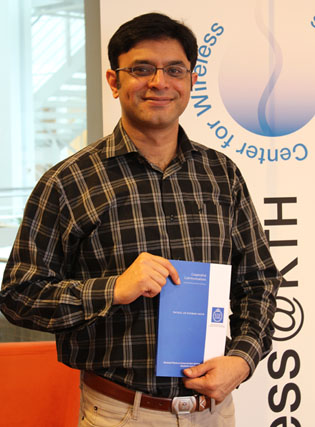PhD Tafzeel Ur Rehman Ahsin
Congratulations on your graduation
Tafzeel Ur Rehman Ahsin came to school of ICT as a graduate student in december 2007. Now he has graduated as a PhD in communication systems.

Where are you from and where did you study before coming to KTH-ICT?
- I am from Tarbela, Pakistan. I took my Bachelor’s Degree in Electrical Engineering (Specialization in Telecommunications) at N.W.F.P University of Engineering and Technology Peshawar Pakistan in 2002. Then I took my Master’s Degree in Systems Engineering (Specialization in Control Systems) at Pakistan Institute Engineering and Applied Sciences (PIEAS) Islamabad Pakistan in 2004. After that I worked as a Senior Electrical Engineer in a Government Sector R&D Department until December 2007. I was awarded a scholarship for carrying out PhD studies overseas from Higher Education Commission (HEC) Islamabad Pakistan in September 2007 and I came to KTH in December 2007.
What is your topic and why did you choose it?
- My work is related to the improvement in link reliability and power efficiency in cellular networks, using cooperative communications. Green communications in cellular networks is a hot research topic these days. This is due to the increased awareness about global warming during the last decade and the increased contribution of energy costs in the operation expenditures of the cellular operators these days. The higher energy costs is due to the deployment of large number of base stations in a cellular network in order to fulfill the high data rate demands of the users.
Cooperative communication between the nodes is a new transmission paradigm that have the capability to improve both the transmission power and the overall energy consumption in the cellular network. Therefore, I have tried to investigate the role of cooperative communications in improving the energy efficiency of the cellular systems. I thought that this is one of the many possible solutions, that could be used to realize the future green cellular communications.
Tell us something about your results.
- It has been shown that the using cooperative communications links can be made reliable (or alternatively transmission power can be saved for a given quality of service) using different methods such as constellation selection at the nodes and joint channel-network coding schemes. The impact of different detection schemes and user groping in improving the link performance is also studied. For improving the overall energy efficiency in cellular network, we have looked at different transmission and resource allocation strategies in cooperative communications.
It has been observed that adaptive relaying schemes along with network coding significantly improve the energy efficiency in the cellular system as compared to the conventional relaying schemes. The tradeoff between the number of base stations and the relays that minimizes the overall energy consumption is also studied.
What would the future bring for your research topic?
- I think the proposed methods can be very helpful in reducing the energy consumption in the future cellular networks and directly contribute towards the green cellular communications.
What are your future plans?
- I will stay for short time in Stockholm after the defense. Then I will go back to Pakistan (Hopefully in April 2012) and continue my work there. I will definitely be in contact with the friends and colleagues In Swede - within KTH and outside - and will be continue doing the research. I would also be happy to come back to Sweden after spending some time in Pakistan, since it is like my second home where I have lived for more than four years. Sweden is really a very beautiful country and people are very nice and cooperative.
Here you can read Tafzeels thesis:
Cooperative Communications, Link Reliability and Power Efficiency, by Tafzeel Ur Rehman Ahsin

